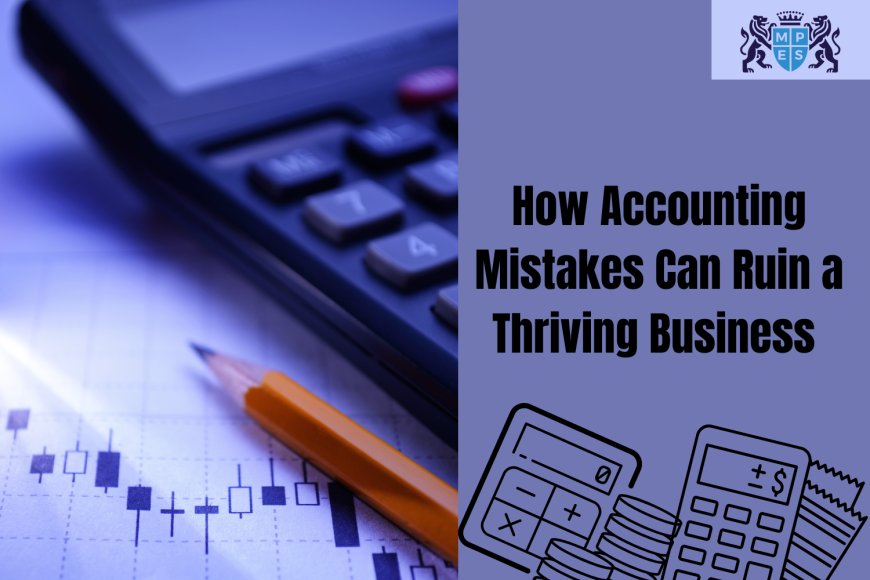How Accounting Mistakes Can Ruin a Thriving Business

Have you ever wondered how one wrong number could take down an entire company? It may sound dramatic, but history is full of examples. For many learners starting with the ACA Certificate Level, the harsh consequences of poor accounting become clear early on. It is not just about numbers. It is about trust, systems, and control. To truly understand What is Accounting, one needs to look at stories about where it went wrong.
This blog uncovers how simple accounting mistakes led to a financial collapse no one saw coming.
Table of Contents
-
Key Accounting Mistakes That Led to a Major Business Collapse
-
Conclusion
Key Accounting Mistakes That Led to a Major Business Collapse
Accounting problems do not always appear overnight. Sometimes, they build up quietly until they break everything. Below are the key ways these mistakes unfolded and ultimately brought down a multi-million-pound business:
Misleading Revenue Recognition
Businesses may give the impression that they are growing when they record revenue too soon or from unfinished transactions. This method may momentarily improve financial statements but frequently leads to misunderstandings and poor choices. The discrepancy between reported and real performance eventually becomes too big to conceal. The company risks losing credibility when stakeholders begin to doubt the numbers. Inaccurate revenue estimates can also result in poor planning, misallocation of resources, and unrealistic forecasts.
Weak Internal Controls
Internal controls are crucial to ensure that financial procedures are appropriately followed. If they are absent or poorly implemented, errors and manipulation can go unnoticed for extended periods. Unverified approvals, missed transactions, and unfettered access to financial systems are a few examples. Such gaps erode reporting integrity by allowing inconsistencies to accumulate over time. It is too simple to overlook or conceal problems if no one challenges the figures or confirms the activities.
Poor Expense Classification
The perception of a company's financial health can be significantly distorted by expenses that are recorded under the incorrect category. For instance, operating expenses that are misreported as investments could inflate profits. These misclassifications may mislead those who are assessing performance or making budgeting decisions. Little mistakes can compound over time and alter a company's reputation with partners or investors. Additionally, it complicates time comparisons, which further impairs financial discernment.
Inflated Asset Reporting
Businesses may give a false impression of their financial strength if they overestimate their assets or values. This could take the shape of assets that are out-of-date, expensive, or unlikely to increase in value. Although the business seems to have a solid base on paper, it might be far more brittle. The ultimate disclosure of such disparities may result in diminished investor interest, a decline in trust, or even legal issues.
Ineffective Auditing
Auditing is essential to guaranteeing the accuracy and dependability of financial statements. However, audits may miss significant problems without independence, enough inspection, or clear rules. As a result of this failure, errors and misstatements can continue to proliferate. Companies that depend on subpar auditing frequently ignore early warning indicators and carry on with false confidence. The distance between reporting and reality grows, making rehabilitation more challenging once the truth comes to light. Internal control weaknesses often go unnoticed, creating opportunities for fraud or financial manipulation. In time, the organisation may face legal consequences or financial collapse due to these unchecked risks.
Lack of Transparency in Financial Reporting
Gaining the trust of stakeholders requires transparency. Confusion and mistrust are fostered when companies don't disclose odd entries, modifications to accounting rules, or concealed liabilities. Investors or regulators may struggle to evaluate the full picture if reports or remarks lack clear communication. Over time, this weakens confidence and can lead to reputational damage and eventually, business failure. Inaccurate or partial reporting might also compromise a company's capacity for collaborations or fund raising. When the truth comes out, stakeholders could stop supporting the business, therefore aggravating its financial situation.
Conclusion
The collapse of these giants was not due to poor products or weak strategies but because of accounting failures that went unchecked. For anyone working in finance, the message is clear: rigour, transparency, and adherence to ethical standards are the true guardians of business longevity.
Consider MPES Learning for improving your accounting skills and strengthening financial integrity in your organisation.







